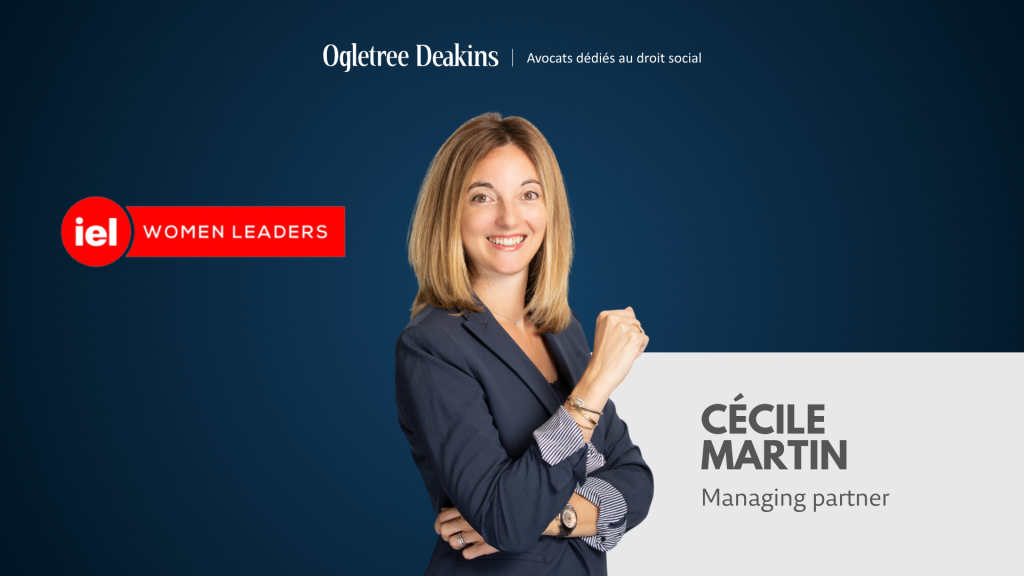
Trois ans après sa première édition, International Employment Lawyer publie sa sélection 2025 des associées « thought leaders » en droit social à l’échelle mondiale, à travers son enquête “Women Leaders”.
Une belle reconnaissance pour Cécile Martin, Managing Partner d’Ogletree Deakins, cabinet dédié au droit social.
IEL Women Leader 2025 – interview de Cécile Martin
Since 2019, Cécile Martin is the managing partner of Ogletree Deakins in France (she joined the firm as partner in 2018). She is a recognised leader in labour and employment laws, as well as data privacy laws applied to HR. With over 20 years’ experience, she advises leading French and international companies on complex labour and employment matters, particularly in restructurings, sensitive executive departures, compensation policies, and discrimination or harassment claims.
Cécile is widely known for her strategic, pragmatic approach to high-stakes matters, and is valued by clients for her business-oriented mindset and ability to navigate both legal and reputational risks.
Having started her career at the French Data Protection Regulator, she also has deep expertise in data privacy and GDPR compliance, with a particular focus on employee data management, cyber-surveillance, whistleblowing systems, and the deployment of emerging technologies, including AI.
Cécile has been actively involved in the privacy community through her roles with the International Association of Privacy Professionals (IAPP), serving as a member of the IAPP DPO France Skills Certification Committee, a former KnowledgeNet Chapter Chair for France, and a member of the IAPP European Advisory Board.
She is ranked among the top employment lawyers Chambers France, Best Lawyers, and Legal 500 EMEA, where she is listed as a “Leading Partner”.
A frequent speaker at both French and international conferences, she also contributes to legal publications.
Among her speaking engagements, she co-organised a Women in Law Empowerment Forum (WILEF) event in Paris on International Women’s Day, focusing on gender parity in the Board Room and in executive management: “How to Advance Farther, Faster?” – a topic aligned with the values celebrated in this survey.
Why did you choose to practice employment law?
I chose employment law because it is at the intersection of business strategy and human dynamics. I was attracted by its direct impact on companies and their leadership decisions. Advising employers means navigating constantly between evolving regulations while supporting strategic transformations, such as restructurings or executive transitions. Early in my career, I appreciated how this field requires not only legal expertise, but also a deep understanding of business priorities and reputational risk. The challenge lies in providing pragmatic, forward-thinking advice that helps organisations remain compliant, competitive, and responsible employers – and that’s what continues to inspire me today.
Across the EU, the lack of clarity around the boundaries of legitimate interest, proportionality, or consent in HR practices creates unnecessary risk
What are you most proud of in your career to date?
I’m particularly proud of contributing to the successful development of Ogletree Deakins in France, and having been appointed managing partner. Building a cohesive and high-performing team of talented lawyers, united by shared values and mutual trust, and earning the confidence of major French and international clients have been key achievements.
I’m also proud of having developed a strong dual expertise in both employment law and data privacy – two areas that are increasingly interconnected. Being recognised by leading legal directories and invited to speak at major conferences has validated this path.
But above all, I take pride in handling complex, sensitive cases that have a real strategic impact for employers.
What are the latest developments or current challenges facing employers’ data protection and privacy obligations and how can these difficulties be best tackled?
One of the biggest challenges today is managing the use of new technologies – such as AI tools, algorithmic decision-making, or enhanced employee monitoring – while ensuring full compliance with data privacy principles, particularly transparency, proportionality, and purpose limitation.
Employers must also adapt themselves to increased regulatory scrutiny and evolving case law across Europe. To address these issues, a multidisciplinary approach is essential, combining legal, HR, IT, and ethical perspectives.
Employers should invest in data governance frameworks, conduct DPIAs when needed, and ensure privacy-by-design.
Anticipating risks and engaging in constructive dialogue with works councils and DPOs is key to building sustainable, compliant practices.
Looking at other jurisdictions, how would you improve on current data protection and privacy legislation or regulation to benefit employers and their workers?
One improvement would be to provide more practical guidance on how to apply core data privacy principles in the employment context, as well as continuing to document AI impacts on the employment area. Some jurisdictions, like the UK, offer very detailed and pragmatic guidance, which helps reduce legal uncertainty for employers.
In France and across the EU, the lack of clarity around the boundaries of legitimate interest, proportionality, or consent in HR practices creates unnecessary risk. A more harmonised and employer-oriented interpretation of data privacy laws in the workplace would enable organisations to innovate responsibly while protecting employee rights in a more balanced and workable way.



